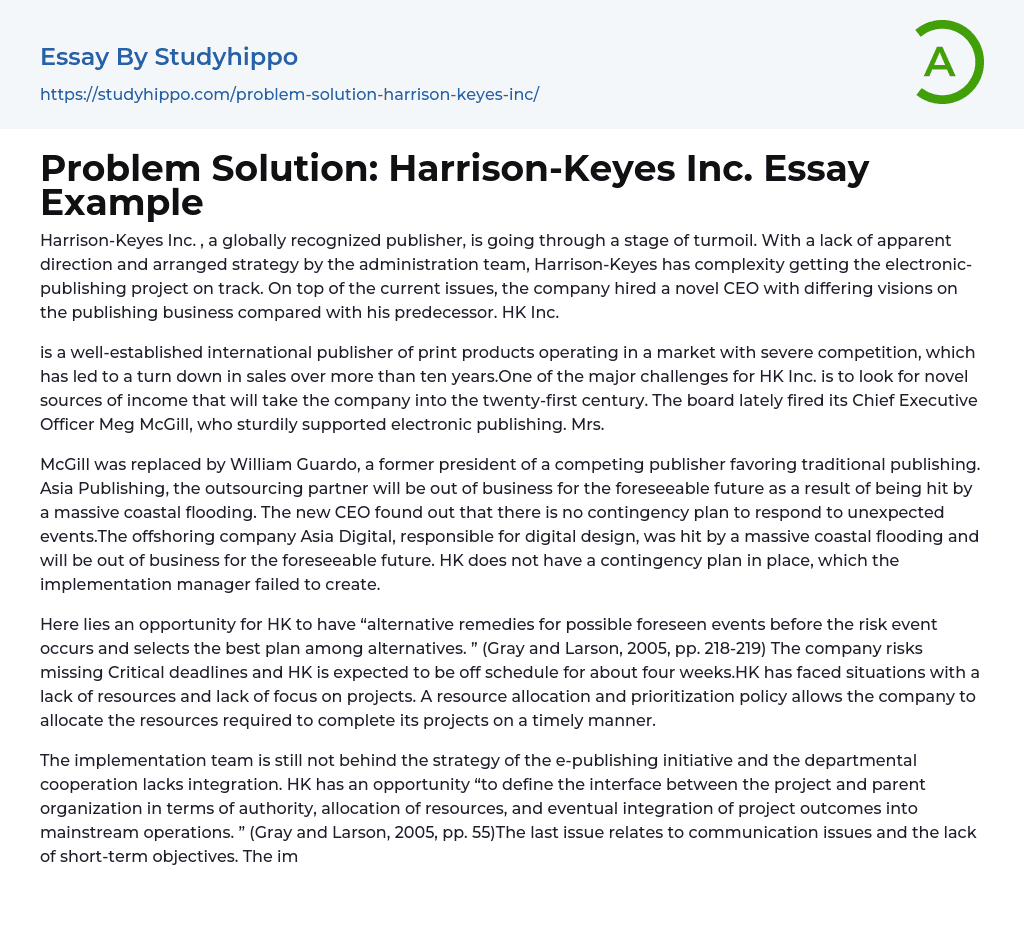The absence of a definite plan and systematic approach from the management team is causing obstacles for Harrison-Keyes Inc., a renowned worldwide publisher, in their electronic-publishing initiative. Additionally, the company is grappling with conflicting perspectives on the publishing industry between the current CEO and their predecessor who recently departed. Consequently, HK Inc. finds itself in a state of flux amid these predicaments.
HK Inc. is an established print publisher, but has been experiencing a decrease in sales for more than a decade due to fierce competition in the market. To remain pertinent in the 21st century, the company must identify fresh streams of revenue, which is a daunting task. Recently, HK Inc.'s board terminated their CEO Meg McGill's employment despite her strong support for digital publishing as part of this effort.
McGill was replaced by William Guardo
..., who had a preference for traditional publishing and was formerly the president of a competing publisher. However, Asia Publishing, the outsourcing partner faced a severe coastal flooding that resulted in its closure for an indefinite period. Furthermore, the new CEO discovered a lack of contingency plans to deal with unforeseen events. In addition to this, Asia Digital, which is responsible for digital design offshoring, also suffered from the massive coastal flooding and will be out of business indefinitely. Thus, the implementation manager in Hong Kong failed to create a contingency plan.
According to Gray and Larson (2005, pp. 218-219), HK has an opportunity to implement alternative remedies to prevent foreseen risk events and select the most effective plan. However, the company is at risk of missing critical deadlines and falling four weeks behind schedule. This is due to previous situation
where HK lacked resources and failed to focus on projects. To address this issue, a resource allocation and prioritization policy can be established to ensure timely completion of projects.
Despite the opportunity for HK to define the interface between the e-publishing initiative project and the parent organization, the implementation team is not supportive and departmental cooperation is lacking integration. Gray and Larson (2005, pp. 55) suggest that HK should allocate resources and authority and integrate project outcomes into mainstream operations. Communication issues and the absence of short-term objectives are additional concerns. By implementing short-term objectives, HK can align operations with the project and create better understanding of the e-publishing initiative. The overall situation involves several stakeholders including the CEO, leadership team, sales, outsourcing company, company customers, and competitors.
When various parties with different values compete, ethical dilemmas can arise. With the addition of a new CEO who brings unique perspectives, even more ethical challenges may emerge. Table 2 presents a detailed list of these dilemmas, taking into account the new CEO as one of the stakeholders. In order to tackle this situation, a problem statement is suggested: "Harrison Keyes aims to become a leading e-publisher worldwide by efficiently managing project plan implementation and reducing risks." The ultimate goal is for Harrison Keyes to establish itself as a significant player in the e-publishing sector.
The project is now back on track thanks to several factors. One of them was the establishment of a specialized project team consisting of experts from various fields. Another contributing factor was HK's significant improvements in resource allocation and prioritization, while ensuring that the company shares common goals and objectives. Furthermore, employees' morale
has improved as they are now well-informed about the value of their role. Lastly, HK resolved technical difficulties surrounding DRM techniques which enabled them to assist major authors in digitizing their work.
HK's planning process now includes contingency plans to ensure projects are finished on schedule and within budget. The company focused on understanding clients and their behavior through strategic marketing efforts. HK's prominent position in the publishing industry is evidenced by achieving the following goals: a 20% decrease in employee turnover within two months due to new strategic initiatives offering employees opportunities, a 12% annual increase in market share in the e-publishing industry, surpassing original forecasts, and successful use of project management techniques resulting in 95% on-time and within-budget deliverables and meeting all critical milestone deadlines. HK also accomplished a prosperous marketing campaign.
The objective is to attain $16 million in e-book sales within 6 months as a conclusive target marking the end-state goal.
- Values of Life essays
- Ethical dilemma essays
- Normative Ethics essays
- Virtue Ethics essays
- Belief essays
- Deontology essays
- Moral essays
- Virtue essays
- Work Ethic essays
- Acceptance essays
- Age Of Enlightenment essays
- Child Observation essays
- Confucianism essays
- Conscience essays
- Critical Reflection essays
- Destiny essays
- Determinism essays
- Empiricism essays
- Environmentalism essays
- Epistemology essays
- Ethics essays
- Ethos essays
- Existence essays
- Existentialism essays
- Fate essays
- Free Will essays
- Functionalism essays
- Future essays
- Good And Evil essays
- Human Nature essays
- Individualism essays
- Meaning Of Life essays
- Metaphysics essays
- Natural Law essays
- Personal Philosophy essays
- Philosophers essays
- Philosophy Of Life essays
- Political Philosophy essays
- Pragmatism essays
- Reality essays
- Relativism essays
- Teaching Philosophy essays
- Time essays
- Transcendentalism essays
- Truth essays
- Utilitarianism essays
- Accident essays
- Awareness essays
- Benefits of Volunteering essays
- Challenges essays




